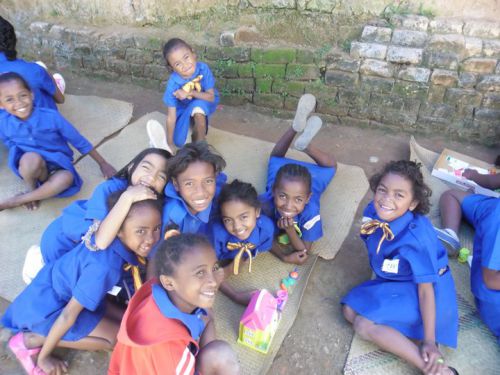EDUCATION IN DEVELOPPING COUNTRIES: WHAT ARE THE PROBLEMS? Case of Madagascar
In 1995, whole 173 nation members of United Nations voted for the MDG. The second objective is “education for all”. In 2007, the UNICEF statistic report showed a quit improvement about the schooling rate. However, it is not necessarily real in developing countries. In 2010, UNICEF launched an appeal to raise awareness of the deterioration of education in Madagascar, knowing that it holds the world record for the repetition. Facing with these situations, we need to make education better. Then, let us see what the main problems are.
Siliva Pasqua, a researcher in education, notices that “women – education in poor countries are low”1. In fact, this is due to three reasons: 
-
“the high costs of sending girls child to school
-
The low private returns to women’s education
-
The role of women in traditional societies
The third reason concerns especially Madagascar. In our country, women are placed to become mothers and wives otherwise they help their mother in subsistence agriculture. Actually, these roles are not compatible with schooling because they keep girls busy for many hours every day. So girls don’t spend much time at school, they may leave primary level without obtaining their first graduation. “Even when girls go to school, domestic works divert them from studying and therefore their outcomes are often poor, thus the rate of dropout of girls is higher” also said Sylvia (Glewwe, 1998).
In fact, this problem is related with life cost. Every year, the prices of class furniture increase and many families haven’t enough money to afford the school supplies or send children to school. Public school often gets financial aid from the State: the Malagasy ministry of education shared Ar 3000 equivalent of 0, 95 $) per pupil per year. Nowadays, the cost of this aid, also called “the school chest”, decrease into Ar 800(0, 25$), even it doesn’t exist ever in some rural regions2. Then, high financial costs of schooling make education less affordable to the poor, whose rate holds the majority of the Malagasy people. By another side, problems don’t only concern families but the institution too. I mean infrastructures and material resources are defective.
According to the International Institute of Education Planning, “the correct resource combination may also be important. Without good textbooks or classroom resources, more teachers cannot necessarily improve the quality of learning”. But in many societies, the benefits of education may be low or not well understood, particularly for girls. This is also due to the school syllabus. This last one is neither appropriate to the needs of the country nor those of citizens or the students. Young people need to be advised on their life career from the middle-school. Actually, there is no program for guidance or counseling. So many students obtain their degrees without knowing what to do and they stay inactive in their societies. This situation is due to inappropriate use of syllabus which is always based on the French old program from the colonization.
SO WHAT CAN WE DO NOW?
Firstly, Madagascar has signed the MDG’s agreement in 1995. The goal N°2 is “education for all”. So, the leaders have to sanction sexual discrimination, instead of giving more opportunity for men in many cases, they ought to consider women as the same. Collaborating or taking actions with Fanilon’I Madagasikara and other women’s association would be more efficiency.
After that, it is very important to change the national school syllabus into a more realistic and productive program. For example, the application of Chemistry needs laboratory but not just theories. 60% of Malagasy people are farmer, so a practical matter related with agriculture is necessary. Added to that, Madagascar is a multicultural country, which has many identities or social culture. The school syllabus needs, then, to be appropriate with this reality. History and traditional culture need to be practiced in real life because these matters are the foundations of our identity. Some of the consequence of the negligence of the basis is the economic and politic crisis we are enduring.
Secondly, people, especially in the countryside, need to be advised on the benefits of education, particularly for girls. It is important for people to know that education car reduce poverty in a number ways.
The last but not least, we must stop the politic crisis because it doesn’t help us to take action or to improve our economy.
I want to propose some solutions but I think it would be easy if each reader gave his opinion. As the Malagasy proverb says: “ny hevitry ny maro mahataka-davitra” (translation: several opinions help to an easier achievement). So, your comments will be considered gratefully
Myriam RIVO alias Fenoangola
Inscrivez-vous au blog
Soyez prévenu par email des prochaines mises à jour
Rejoignez les 37 autres membres
